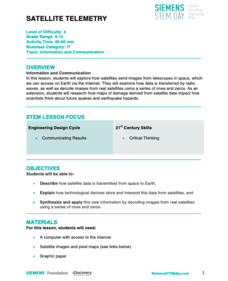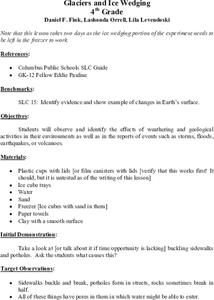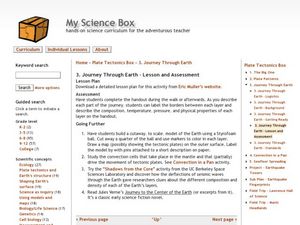Space Awareness
Living in the Milky Way
Get to know our galaxy with an astronomy-themed, hands-on activity. Scholars watch an informative video, answer questions, and construct a model of the Milky Way in order to examine its contents and the distance inside it.
American Museum of Natural History
Create a Compass
Historically, humans have used many methods of finding due north. Using a hands-on activity, learners create their own compasses. They then test their compasses in their neighborhood or to assist with stargazing.
Space Awareness
What is a Constellation
Why do some stars in a constellation appear brighter than others? Using a get-up-and-move astronomy activity, scholars explore perspective and the appearance of constellations in the sky while developing an understanding of the...
Science Matters
Earthquakes and Volcanoes Pre-Assessment
See how much your class knows about earthquakes and volcanic activity and how these events shape geologic features. The first lesson in the series of 20 is a pre-test to find out what pupils already know. It includes 10 vocabulary...
Howard Hughes Medical Institute
The Day the Mesozoic Died
While this is not the traditional, step-by-step lesson plan, it is chock-full of material that you can easily incorporate into your earth history unit. Its main purpose is to serve as a guide to using a three-part film, The Day the...
Discovery Education
Satellite Telemetry
Satellites require rockets to launch, but it doesn't take a rocket scientist to understand them. Future engineers learn about how satellites send data to Earth and how to interpret satellite images. They see how radio waves play a role...
Population Connection
Lessons From the Lorax
Is progress progressing too fast? So believes the Lorax, the eponymous character from Dr. Seuss's The Lorax. Young environmental science students read the book and debate the arguments of the Lorax and the Once-ler regarding the...
Curated OER
Glaciers and Ice Wedging
Fourth graders observe and identify a variety of weathering and geological activities in the area in which they live. This focuses primarily on what happened during the Ice Age, and how, even today, glaciers are shaping and re-shaping...
Virginia Department of Education
Modeling the Big Bang Theory
Young astronomers learn about the Big Bang Theory and redshift through a hands-on activity in the last installment of a three-part series. Participants draw dots on balloons and then inflate them to model how galaxies moved farther apart...
Space Awareness
Let's Break the Particles
Build learning by breaking atoms! Young scientists study the way energy changes with a hands-on activity. As they roll steel marbles down a ramp, learners test the hypothesis that kinetic energy does not go away with friction...
Institute of Electrical and Electronics Engineers
Solar Structures
It's time to soak up the sun! Youngsters read about active and passive solar heating systems, then they collaborate to create a miniature solar-heated building. Provide a variety of materials for them to incorporate and watch their...
Curated OER
Natural Disaster
Describe how plate tectonics account for various land formations. Learners discuss different marine sanctuaries and create a poster about tectonic activity in these areas. They share their posters with the class.
Howard Hughes Medical Institute
What van Leeuwenhoek Saw
When van Leeuwenhoek saw cells and single-celled organisms for the first time, he knew these small things were a big deal! Share his discoveries with young learners through a narrated video, model-building activity, and scale study....
Scholastic
Study Jams! Igneous Rocks
Dynamic music pumps up viewers as they learn about intrusive and extrusive igneous rocks. Presentation slides include a graphic depiction of magma below Earth's surface , photographs of lava exploding and flowing, and close-ups of...
Curated OER
Gliding Glaciers
Glaciers are the star of the show in this Earth science lesson. In it, learners gain an understanding of how glaciers are formed, how they move, and what types of landforms they create. This lesson plan is written in the classic format,...
Curated OER
El Niño ~ The Return of El Niño
El Niño sure creates a stir when it comes around! Why not stir up your earth science class with this data analysis activity that examines the temperature and precipitation over the 2002-2003 water year. A tracking chart is provided...
Curated OER
How Does Your Garden Grow? Discovering How Weather Patterns Affect Natural Cycles
For the warm-up in this cool climate lesson, you will need to click on "Mapping" and then "US Mapping" once you arrive at NOAA's "US Climate at a Glance" page. Earth science explorers realize that 2012 was a warm winter for us. They read...
Curated OER
Ecosystems
An in-depth look at ecosystems is outlined in this 13-slide PowerPoint. Students will learn about different types of ecosystems on our earth. An activity is provided on slide eight, as well as three scenarios to analyze on slide nine....
NASA
Natural Resources on Earth
Natural resources do not always occur so naturally. Lead classes through a thorough set of lessons investigating the natural resources important for plants. Learners complete a series of worksheets as they explore the information and...
Curated OER
Journey Through Earth
Students study plate tectonics. In this plate tectonics instructional activity students build a cutaway scale model of the Earth.
Curated OER
Earth Viewer
Students explore the Earth. In this space lesson, students view the " Earth and Moon Viewer" web site and complete a related worksheet.
Curated OER
Layers of the Earth
Students identify the layers of the Earth and complete activities for the topic. In this Earth layers lesson, students chart their ideas about the Earth's layers and view a PowerPoint for the topic. Students view an apple to learn about...
Curated OER
Earth Science: In Depth Look at Earthquakes
Learners engage in an interactive Internet instructional activity covering the reasons and results of earthquakes. After reading eyewitness accounts and viewing animations, they use seismograms to measure and locate the epicenters. In an...
Curated OER
Earth's Seasons
Sixth graders review the relationship between the Sun and the Earth. In groups, they use a globe and flashlights to show the shadows on the Earth during the different seasons. To end the lesson, they write in their journals about their...

























